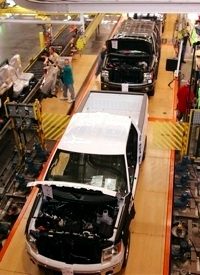
The bill, strongly favored by many lawmakers, would have given $14 billion in loans to the big three automakers to prevent Chapter 11 bankruptcy restructuring. According to a press release from GM, the bill would have brought them “closer to saving jobs and to creating a more competitive U.S. auto industry in order to maintain America’s economic vitality”, and if passed by the Senate would have allowed them to “continue at full speed on the restructuring and advanced technologies plans that will form a stronger, more viable GM.”
In addition to urging from the Big Three automakers, President Bush had also shown support for the measure. During a speech about the economy on Dec 5th, the President urged Congress to take action on the bill saying: “It is important that Congress act next week on this plan. And it’s important to make sure that taxpayers’ money be paid back if any is given to the companies.”
President-elect Barack Obama also strongly supported a bailout of the automakers. According to Reuters, he said “he hoped a congressional deal to bail out the struggling U.S. auto industry could be reached this week, saying again that Detroit’s ‘Big Three’ automakers could not be allowed to collapse.”
The New York Times reported that according to Senate Republicans, the measure failed because the United Automobile Workers Union (U.A.W), under the leadership of president Ron Gettelfinger, refused to allow wage concessions in 2009 as part of the deal. Those wage concessions were proposed by Senator Bob Corker of Tennessee, who, according to the Times, “said he proposed that wages and benefits of U.A.W. members be competitive with lower rates at American plants run by foreign rivals — Toyota, Honda, Nissan and B.M.W. — during 2009, and offered the union the opportunity to pick the date next year when the changes, which would be certified by the Labor Department, could be put in place.”
According to the Times’ report, when that deal could not be reached, “Mr. Corker said he could not sell a compromise to other Republicans.”
Critics argued that the bailout bill would be only a temporary solution to a problem that will continue to cause harm in the long-run. Speaking about the proposed bailout in the House of Representatives on Dec 10th, 2008, Congressman Ron Paul said the bill “doesn’t make much sense” and noted that with the bill the Congress was only “tinkering on the edges without dealing with the real problem.”
In the same speech, Congressman Paul said of the Congress: “we don’t want to go back and find out how do financial bubbles form, and why do they burst.” In the past, Congressman Paul and other critics have said that our current economic problems have been caused by inflationary monetary polices pursued by the Federal Reserve.
Although the bill died in the Senate, FoxNews.com reported that the White House is talking about using a portion of the earlier Wall Street bailout’s $700 billion to prevent the auto industry from failing.
See also "Run Auto Companies? “We Cannot Even Run the Government,” Ensign Says."



